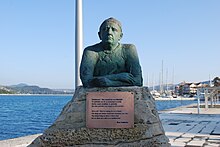Nikos Kavvadias
Nikos Kavvadias ( Greek Νίκος Καββαδίας , * 1910 in Harbin , China , † February 10, 1975 in Athens ) was a Greek poet and a sailor. He did not consider himself a poet who liked to travel or a sailor who liked to write poetry. Rather, both professions were inextricably linked for him.
Life

Kavvadias was born in 1910 in Harbin, Manchuria , and grew up on the Greek island of Kefalonia and in Piraeus . Like many other young people in Piraeus about to choose a career, he decided to join the merchant navy. He was constantly on long journeys on large freighters and mail ships that were also used for passenger service. By 1939 he worked his way up from a simple young seaman to a radio officer.
At the beginning of the Second World War , Kavvadias was a soldier on the Albania front. During the German occupation he stayed in Athens . From 1944 he went to sea again and in the following 30 years traveled to many large ports in almost all parts of the world. He was not granted a long retirement. He died of a stroke shortly after his last trip in Athens in February 1975. He had sometimes said to friends that he hoped his death would meet him at sea. On his deathbed he is said to have said: "What I have always feared will happen now." By this he meant death on land and burial in an earth grave.
His literature
When leafing through his books for the first time, it is noticeable that almost all poems consist of neatly rhymed four lines, either in the sequence AABB, ABBA or ABAB.
Kavvadias' first collection of poems entitled Marabuerschien (1933), the second, Nebel , followed in 1947, and the third, Traverso , shortly before his death. The title of the last collection is an expression used by Greek seafarers for the deviating course that is necessarily taken in very unfortunate weather conditions. Such course deviations can make entire ship's crews annoyed. In the last poems of Kavvadias there is a sense of bitterness that may arise among seafarers when a course contrary to the intended travel route has to be taken.
In Greece, Kavvadias is mainly known for his poems, especially those set to music by Thanos Mikroutsikos and published under the title The Southern Cross . But he also wrote about 200 pages of prose , which are also available in German translation in the book Vardia (Guard).
Although Vardia is mostly referred to as a novella in literary encyclopedias , it is more about autobiographical stories from Kavvadias' life as a sailor. Most of the book is taken up by the conversations he had as a radio operator with the officers on watch during the night watch on the bridge. It is only too obvious that the main character, radio officer Nikos, is identical to the poet Kavvadias.
First and foremost, they are memories of events that had taken place on land and at sea during his long career in the Greek merchant navy. Many of these memories are about women. Nikos had a great weakness for prostitutes, but he respected them. His relationship with them was honest, decent, and sometimes even loving. Surrealistic self-reflection passages are intertwined with his memories.
Work in German translation
- Li, edited by Torsten Israel; Translation by Cornelia Enger and others Llux Agentur & Verlag, Ludwigshafen 2016.
- The guard. From modern Greek by Maria Petersen . Alexander Fest Verlag, Berlin 2001, ISBN 3-8286-0168-5 .
literature
- Guy Saunier (Ed.): Νίκος Καββαδίας, Το ημερολόγιο ενός τιμονιέρη. Αθησαύριστα πεζογραφήματα και ποιήματα. Άγρα, Athens 2005.
- Guy Saunier: «Ετούτο το κορμί το τόσο αμαρτωλό ...». Έρευνα στον μυθικό κόσμο του Νίκου Καββαδία. Άγρα, Αθήνα 2004.
See also
Web links
Individual evidence
| personal data | |
|---|---|
| SURNAME | Kavvadias, Nikos |
| ALTERNATIVE NAMES | Καββαδίας, Νίκος (Greek) |
| BRIEF DESCRIPTION | Greek poet and sailor |
| DATE OF BIRTH | 1910 |
| PLACE OF BIRTH | Harbin , China |
| DATE OF DEATH | February 10, 1975 |
| Place of death | Athens |
